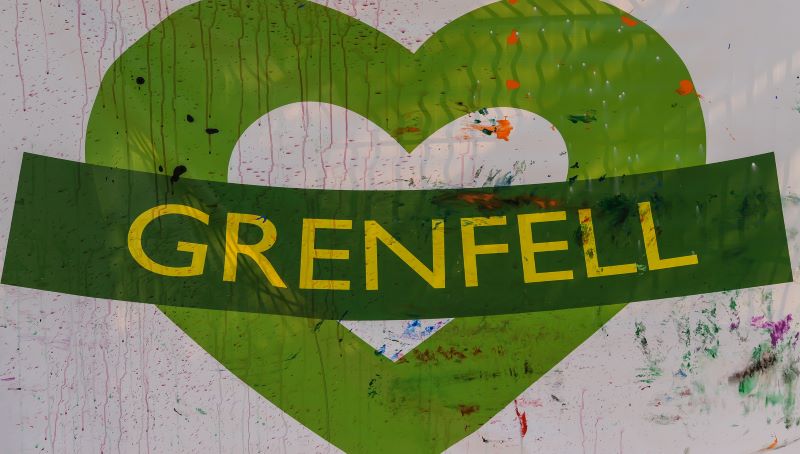
By Danielle Aumord.
The governmental department supposed to provide a liaison between central and local government during an emergency failed to realise that the Royal Borough of Kensington and Chelsea (RBKC) was struggling to cope with the immediate aftermath of the fire (16–26 May 2022).
The Department for Communities and Local Government (DCLG) was supposed to provide a liaison between central and local government during an emergency but was initially unaware that RBKC wasn’t responding well in the aftermath of the fire, heard the public inquiry into the blaze in which 72 people lost their lives on June 14, 2017.
Sir Philip Rutnam, permanent secretary to the Home Office at the time, told the inquiry that senior figures at the then named DCLG, were “at risk of panicking”.
He said that he also feared that the department would “comprehensively mess up” the response to the Grenfell Tower fire if it was left in charge.
Mark Sawyer, chief executive liaison officer at the London Local Authority Gold (LLAG), also gave evidence at the inquiry. A collective mechanism, the LLAG’s function is to mobilise support from all 33 local authorities in the capital if there is a disaster that needs that level of support – which the Grenfell Tower fire was. But as we’ve previously seen, RBKC failed to request this assistance.
Mr Sawyer told the inquiry: “There is no, as far as I’m aware, legal basis upon which Local Authority Gold can intervene in the affairs of an individual local authority. Therefore, it had to be a request rather than imposed.”
However, concerns began to mount, and Mr Sawyer was actually deployed to RBKC the day after the fire to support its response. He said it “started to hit home” throughout this day that the local authority was struggling to cope with the response.
But even when RBKC’s hands were forced, and they realised that they needed the support from LLAG, the public inquiry heard that they still tried to maintain control. “I felt I was a guest in RBKC – I had been allowed in, rather than having the authority to instruct and change,” Mr Sawyer said.
John Barradell, chief executive of City of London Council, who had been widely described as having stepped into the role occupied by Mr Holgate once the London-wide response was belatedly activated on 16 June, told the public inquiry that in reality, this is not what had happened.
“Was it the case, to your understanding at the time, that once LLAG was activated, then the LLAG person, in this case it was you, took over and no longer supported but actually occupied the role of Gold previously occupied by Nicholas Holgate?” asked Richard Millet QC, lead counsel to the inquiry.
“Absolutely not,” responded Mr Barradell.
Instead, he said his role was to chair meetings in RBKC and that he “stood by them, not in their shoes”.
Mr Barradell expressed his regret to the inquiry at not being more forceful in asking to take over control of the response, adding that the “picture being painted” by RBKC was that it had sufficient capacity and expertise to deal with the aftermath of the fatal tragedy.
He also accepted that the some of the problems with the ground level response – difficulties at the rest centre, poor communication with those in hotels – continued even after RBKC was replaced.
He described a situation where he was confronted with the case of 12 families who were placed in a Premier Inn in Hammersmith with no money. They waited six days before being contacted by local authority staff about support arrangements.
The inquiry even heard that several residents from the wider estate ended up sleeping rough after the fire, after being told they weren’t allowed to return to their homes within the police cordon.
Mr Barradell admitted that these scenarios were “not acceptable” and that there was “a lot of learning [to be done] about the support for communities”.
Nicholas Hurd, the former fire and policing minister, said he was “ashamed” of the state’s “wholly inadequate” response to the fatal fire, adding that he could see why it would’ve “led some people to believe there was institutional indifference” towards the community.
He said that central government should have provided more support to the local authority but that they lacked genuine information about how much the council was struggling to cope.
Lawyers for the bereaved and survivors chronicled how the council’s efforts to respond to the crisis “collapsed in spectacular fashion”, with a lack of communication, an absence of official figures, no information about whether loved ones had lived or died, chaos at ‘rest centres’, and other survivors “abandoned” in hotels for days.
A Grenfell response meeting which wasn’t attended by Mr Holgate also contained no conversation about critical issues such as the establishment of ‘rest centres’ to support the impacted community.
Mr Hurd responded: “Of course, this is unforgivable in hindsight, but in the absence of anyone raising a problem, the conversation moves on.”





